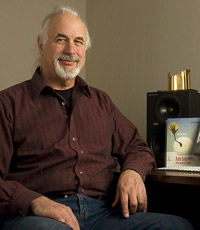
Les Paul, 1915-2009
As a guitar player, I was of course saddened by the death of the legendary music innovator Les Paul. I do want to take this opportunity to pay tribute to him, but I also want to take this opportunity to reflect on another music innovator, one that’s less well-known than Les Paul and is in fact reviled by some:

Harold "Dr. Andy" Hildebrand. Still alive.
No, I’m not referring to T-Pain (or Andy Samberg, for that matter). The musical innovator in this case is Harold “Dr. Andy” Hildebrand, the inventor of the infamous Auto-Tune pitch correcting/distorting software.
At first blush, the inventor of the electric guitar and multitrack recording and the inventor of Auto-Tune are worlds apart. One was a virtuoso guitarist and inventor; the other was a software engineer who based his pitch-correcting algorithm on seismic studies for oil companies. One’s innovation made rock ‘n’ roll possible, the other’s innovation made, um, this possible…
http://www.youtube.com/watch?v=AAxailJPU5Q&start=15
…and also provoked death threats from Jay-Z:
So what to Les Paul and Andy Hildebrand have in common? Putting aside normative judgments on pop music, I can state with confidence that Hildebrand is just as influential of a music innovator as Les Paul. His software is used in the vast majority of commercial pop music recordings, and the extreme T-Pain style usage of the software has left an indelible mark on the pop culture landscape of the last few years.
But few would put Hildebrand in the same ballpark as Les Paul. This is understandable, given that mainstream society places great value in both the Les Paul guitar and much of the music created by it…
http://www.youtube.com/watch?v=N9i2fqxSjTI
…and that mainstream society ridicules the vocalizations of T-Pain and Kanye made possible by Hildebrand’s software.
Led Zeppelin is timeless. T-Pain and Kanye will be relegated to the dustbins of pop culture has-beens.
Les Paul and his guitar left an indelible and overwhelmingly positive mark on pop music. Andy Hildebrand and his software are leaving an ugly stain.
But it’s not that simple. First, one could argue that the standard usage of Auto-Tune has greatly advanced the recording of all kinds of pop music by eliminating the need to perform dozens of takes/overdubs to get the right sound. The more efficient the recording process is, the easier it is to create high-quality recordings, and the easier it is to create high-quality recordings, the easier it is for upstart musicians with not a lot of cash and time to get their music out to a wide audience.
Second, and perhaps most importantly, we have no idea how history will look back on even the most extreme Auto-Tuners such as T-Pain and Kanye. In fifty years, perhaps we’ll regard Auto-Tune as just another effect to apply to an instrument (the human voice), much as we regard amplification and tape echo as totally legitimate effect to apply to a guitar (both were essentially invented by Les Paul). Perhaps these notions of the purity of the human singing voice will fall by the wayside, and Andy Hildebrand will be lauded as a great musical innovator and enabler along the lines of Les Paul.
Or perhaps not. It’s too early to say what Hildebrand’s legacy will be.
As for Les Paul, his legacy is clearly a great one, and I celebrate it as I mourn his passing.
May Hildebrand be so lucky as to be this highly regarded in death.
“Led Zeppelin is timeless. T-Pain and Kanye will be relegated to the dustbins of pop culture has-beens.”
Really? Of course time will tell, but it is interesting to see how heavy Auto-Tuning is still referred to as the “Cher effect” after “Believe.” It seems like you can get some mileage out of being the popularizer of any kind of effect.
(You might also find some other angles in a post I wrote about Auto-Tune and drag performance: http://noiseforairports.com/post/147647000/nothing-natural-about-vocal-skill ) I’m curious if there are any parallels to to Les Paul with that kind of argument…
@nick, you gotta read the rest of the post before you reply, man. The sentence you quoted and responded to is a straw man: two sentences later, Lee points out himself that “it’s not that simple,” and starts pointing out some of the benefits of Auto-Tune.
I do like that article of yours that you linked to. And I like the distinction you make between “legible” and “illegible” uses of the technology. What’s the last video – the first popular (mis)use of autotune – supposed to be? Vimeo took it down, so now your post kind of ends on a question mark.
The thing that confuses me about heavy autotune is not that it erases the distinction between the skilled and the unskilled, but rather that it erases all differences between people’s voices. Take a listen to the Jamie Foxx feat. T-Pain song “Blame It”. With both of their voices autotuned into submission, what do you gain by bringing T-Pain in?
The answer is that T-Pain has created an identity for himself as “the great autotuned hook singer.” If autotune really can erase the distinction between the vocally talented and the talentless, we’ve responded to it by creating a new categories of haves (T-Pain, a few others) and have-nots (everyone else). This maps nicely onto the electric guitar, or at least onto amplification. Before electric instruments, if you wanted to perform for a stadium full of people, you needed an orchestra, and that runs into real money. Theoretically amplification puts this amount of loudness in everybody’s reach. Instead, we decided that certain unnatural, distorted guitar tones were more desirable than others, and as a result you end up with $10,000 guitars (and further down the lunatic pipe, like, $600 hand-tooled “heavy grain” amplifier knobs). This isn’t quite the same, obviously. Autotuned singers sound pretty much the same, while there’s a wide, wide variety of electric guitar sounds. But it’s close enough for hand grenades or cultural criticism.
Is there an analogue for this in terms of gender identity? I can’t think of one… some celebrities are allowed to play with gender roles with relative impunity, true (think David Bowie), but this feels very different.
You know, maybe I should watch myself when I say “Autotuned singers all sound the same.” Not too long ago, I remember hearing people say that rappers all sounded the same. I thought that was absurdly out of touch at the time… maybe I’m just getting too old for the game. What do people think? Does T-Pain have a vocal identity outside of “that autotune guy?”
The Missing Link: Peter Frampton and his talk box/ effects pedal.
@Stokes
Fair. I did read the rest but could have been clearer about how I agree with it (and disagree with what still reads as a bias toward the electric guitar over Auto-Tune). I mostly wanted to suggest that we already have a little historical perspective on Auto-Tune use dating back to Cher in 97 or 98 (who just so happens to have been the last video on that post; I guess it was only a matter of time before the law found out).
And I agree with your second comment on disagreeing with the first; Auto-Tune does not actually make all singers sound the same. Look at Lil’ Wayne, for example, who does astounding things with it. There is certainly something in common between all these voices that is not usually the kind of thing voices have in common (namely a digital timbre), but among electric guitars, you also have this similarity.
It might make more sense to compare Auto-Tune to the distortion pedal—an effect, not an instrument in itself. It would be easy to say that all guitars with distortion sound the same, but similarly inaccurate.